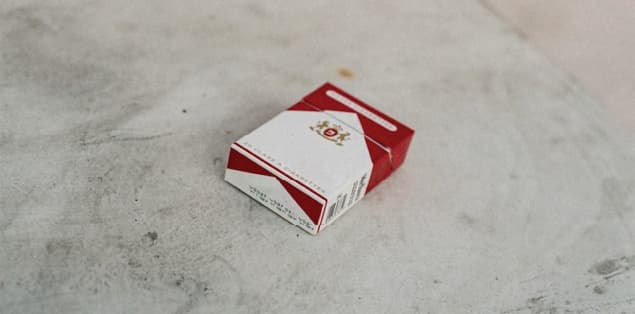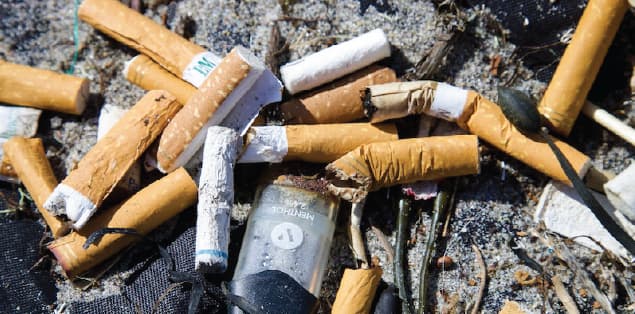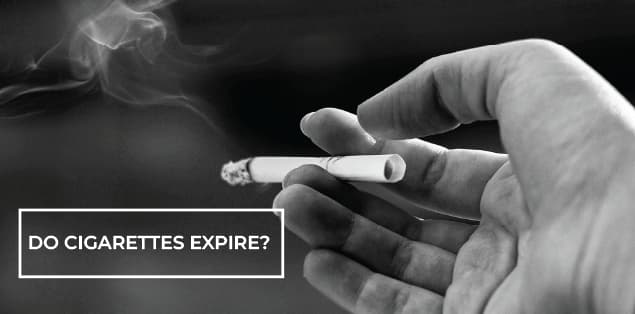So, do cigarettes expire? A cigarette is just a tiny cylinder filled with a flammable substance. Usually, tobacco is rolled onto plain paper and smoked. The cigarette is lit on one end and allowed to smolder; the ensuing smoke is inhaled orally via the other end. The most popular mode of tobacco use is cigarette smoking. “A drug delivery mechanism for the supply of nicotine in an acceptable and appealing shape,” according to the cigarette manufacturers.
The term cigarette is most usually associated with tobacco cigarettes; however, it may also apply to other substances like cannabis (Jazz) cigarettes or herbal cigarettes. A cigarette is distinguishable from a cigar by its smaller size, treated leaf, and white paper wrapper. A cigarette is a fag; people also call cigarettes as stogs, boges, cigs, ciggies, smokes, darts, and tabs.
Scientists and clinicians have just been able to correlate smoking to respiratory ailments since the 1920s. Researchers have linked chronic obstructive pulmonary disease, cancer, heart problems, and other health issues affecting practically every body organ to smoking cigarettes. Tobacco’s psychoactive ingredient, nicotine, makes cigarettes very addicting. In addition, nearly 50% of cigarette users die from tobacco-related diseases, resulting in a 14-year reduction in life expectancy.
Tobacco products and cigarettes kill more than 8 million people globally every year, with 1.2 million people dying due to secondhand smoke exposure. But let us suppose a smoker ran out of cigarettes and came across an old box containing one or two sticks. Or maybe you’re just a “light” smoker who wants to know how long your smokes will last until they expire. So what happens if you smoke a cigarette that has expired?
Do Cigarettes Expire If Unopened?

A brand-new, unsealed box of cigarettes might last for about two years after being manufactured. However, as soon as you breach that airtight barrier, the cigarettes experience certain alterations, regardless of how early or later it is well after the manufacture date.
Another reason why it’s difficult to spot stale packs is most cigarette packaging does not have an expiration date. As per the World Health Organization, writing expiry dates on tobacco packages gives the impression that is smoking cigarettes before that date is “safe.” In the absence of an expiry date, some packaging carries the production date or the latest before date.
Whether cigarettes expire or not, the risks are the same, and they involve anything from cancer to skin disorders, reproductive troubles, and IBS. Now, because cigarettes don’t have an expiration on the package doesn’t imply they’ll never go bad. Old cigarettes aren’t worse than you get from new cigarettes, but their flavor and freshness will be affected by exposure to oxygen and time.
When Do Cigarettes Expire?

Cigarettes do not technically expire. They do, however, get quite stale with time, particularly whenever the bundle is open to the atmosphere. Commercial cigarettes have about two days until they grow stale after being opened.
Cigarettes and tobacco include oils and resins that provide moisture and freshness right after manufacture. When you expose cigarettes to oxygen, you force moisture out, causing them to expire or get stale. It can also change the burn pattern of the tobacco paper. This is why used cigarettes burn out sooner than fresh cigarettes. Cigarettes don’t even have an expiry date, yet their quality deteriorates dramatically with time.
The tobacco manufacturer does not include the expiration date on cigarette packs. As a result, determining when the manufacturer created the cigarette package is difficult. On the other hand, the tobacco corporation marks the smoke packaging with Julian codes, which are internal systems. These code numbers tell you where the manufacturers made them and what kind of tobacco they used to manufacture them.
You may determine the cigarette’s manufacture time by looking at the Julian code. Cigarettes don’t decay, but when they are old, they perform poorly. You may lose the moisture in the tobacco of an old and ruined cigarette. It has a unique flavor that might be difficult to appreciate.
How Do You Tell If a Cigarette Is Expired?
The most apparent technique is to inhale one and pay attention to any unpleasant flavors or airflow issues. For example, you can check for visual symptoms of staleness if you would not want to hazard consuming a stale cigarette. Check whether any tobacco comes out of the end of the cigarette as you roll it between your fingers. This indicates staleness.
The simplest and least secure way to tell if a cigarette is stale is to try it. You’ll notice a few things: Stale cigarettes have an awful flavor. Menthols, in particular, will have a strong flavor. They have a stronger flavor than new cigarettes, making it difficult to inhale and exhale the smoke.
Suppose you don’t want to take the chance of inhaling stale tobacco. Then look for the following signs:
Spots that are brown or yellow: Moisture and oils leaking from the tobacco cause deep brown or yellow stains on old cigarettes.
Stale odor: Stale cigarettes have a papery, bland aroma that does not create a lasting impression.
Tobacco is receding: The tobacco within a moldy cigarette may dry up due to the lack of moisture; roll just between your fingers, but if chunks of tobacco fall out, it’s most certainly expired.
What Happens After Smoking Expired Cigarettes?
The most typical concern you’ll have is that additional nicotine will build on the respiratory sac, causing harm to your lungs. However, you may find that your hunger does not reduce quickly, and loose stools are a typical symptom.
You’ll see a lot of hair falling out. You’ll be coughing all the time, and your throat infection will take center stage. It will hurt your chest. Please don’t fool your body; you never know what sickness will strike once it does. Be cautious because there are over 1000 illnesses linked to smoking and gene mutation. Otherwise, face the consequences with bravery.
It doesn’t imply you should light up stale smokes just because you can. In reality, you’re endangering yourself. Tobacco is made up of dried leaves and is used to make cigarettes. As a reason, expiring cigarettes are more likely to develop mold or fungus, especially if you store them in an environment with inconsistent humidity or temperature control.
Smoking a moldy stick might not have any long-term consequences if you’re in good health. For example, you may encounter unpleasant symptoms, including nausea, vomiting, and choking at the very least. However, if you’re allergic to mold, the risks are significantly greater. It can, for example, induce inflammation in your lungs or sinuses. Sinus leakage and discomfort, moderate and extreme congestion, and wheezing other symptoms might occur.
Finally, breathing smoke from a moldy cigarette can be fatal if you have lung disease or a weakened immune system. For example, fungi such as Cryptococcus, Aspergillus, and Mucor can cause severe lung infections. They have the potential to harm the central nervous system and the brain. However, due to the impacts of smoking, many smokers already have weak lungs and immune functions. One moldy, outdated cigarette is all it takes to endanger your life and health. Worse, it is nearly impossible to determine if a cigarette includes fungus by just looking at it. The mold has already entered your system when people detect the symptoms.
Do Cigarette Packets Have an Expiration Date?
When purchasing food or drinks, you always look at the expiration date. Many smokers, however, are unaware that cigarettes have an expiration date. However, most smokers continue to purchase cigarettes without paying close attention to the fine print on the cartons. Like food and liquids, cigarettes have an expiration date, which many people are unaware of.
You can use the color of a tape connected to the pack of cigarettes to determine if someone has examined the cigarettes for a long period or not. The procedure is incorrect. Checking the manufacturing code will reveal whether or not the cigarette has expired. The cigarette pack’s manufacturing code contains information on the cigarette’s manufacture date, month, and year.
Health information comprises the compiled code, date, month, and year of manufacturing and the identity and address of the company, put on the lower side of the package, according to Minister of Health Regulation 28/2013 Article 10 paragraph (2) letter c.
However, you should note that the expiry of cigarettes is indeed not similar to that of food or beverages. Smokes with a long manufacturing time are not necessarily stale, but their flavor is no more as appealing as fresh cigarettes. Although the cigarette packet is covered to prevent air from entering, outdated cigarettes will generate many yellow stains. In addition, any tobacco company mentions the expiry date of a cigarette.
Do People Keep Tobacco in the Freezer to Keep It Fresh?

For a long time, smokers have kept tobacco and plants in the freezer, and many people would ask us if it is an efficient approach to keep the product pure and moist. The judgment is yet out on whether it is a successful strategy. Smokers who advocate utilizing freezers for storage argue that quantity or packaged tobacco will keep fresh in the freezer if left undisturbed, making it ideal for long-term preservation.
Some argue that freezing your product would dry it out, causing it to lose both its flavor and any extra components. Furthermore, some claim that the light and ‘action’ of opening and closing the freezer door would reduce the efficacy of herbs or tobacco due to stress on the plant. Therefore, people hotly argue whether freezing helps or not, or if it is a personal taste and condition question.
More smokers believe that keeping herbs in the freezer is a bad idea. Some individuals, though, swear by it! Freezing may also work for some people; perhaps they have a deep fridge in their basement that no one uses. Perhaps cooling works for their bespoke mix, and they’ve never had a dry leaf from freezing it.
Many smokers believe that freezing is hazardous for a variety of reasons. For example, tobacco and plant products do not appreciate extreme cold and should be kept in cool, dark places. People claim that herbs may be stored in a cabinet, a brown paper sack, or even the refrigerator in a pleasant environment, as long as they are tightly packed and not exposed to excessive light or activity.
Even the refrigerator is good – however, most individuals use their refrigerator frequently, exposing it to a cheerful tone and movement. In this instance, a refrigerator isn’t the best option. Because a freezer is so cold, everything stuck with the tobacco or herbs may frost like icicles and snap off, destroying any active components and taste. If you have to warm the product for a brief smoke, you’ll lose more moisture, quality, and freshness.
What Is the Value of Expiration Date in Cigarettes?
You must first consider the potential “Post Expiration” repercussions, whether you have consumed or drunk anything. Manufacturers frequently state the expiration date on a ‘best used before’ basis, conveying the concept that date beyond the notified date might result in health concerns. It is not necessarily a sign that something is unsafe to consume or use. Instead, you will revisit each expiration date in the future.
Final Words
Yes, cigarettes can expire, but that is only true if you keep your cigarette box open. Many educators and researchers on Quora believe that an unsealed cigarette box may survive two days before becoming stale. There is also smokeless tobacco these days. The tobacco in cigarettes includes oils that keep them fresh by preventing them from interacting with moisture. When cigarettes come into contact with air, they expire or grow stale. A saying goes – “Cigarettes don’t expire; the person consuming them does.”
After reading the text above, we believe you will understand one thing very clearly: smoking cigarettes is bad for your health, regardless of whether the package is expired. So, honey, we advise you to stop smoking and provide yourself the opportunity to enjoy a smoke-free life.
